National Customs中华传统节日
- 格式:doc
- 大小:63.50 KB
- 文档页数:7

中国传统节日Traditional Chinese holiday中国的传统节庆膳食是节日必不可少的伴侣。
例如,我国的端午节(the Dragon Boat Festival)是纪念古代诗人屈原的日子。
那一天,人们通常要赛龙舟、吃粽子(zongzi)。
中秋节是观赏满月的日子。
圆圆的月亮象征着圆满,象征着家庭团聚。
因此,中秋节(The Mid-autumn Festival)的特制食品是一种圆形的月饼。
春节是中国的农历新年(the Chinese lunar New Year’s holiday),除了常见的家禽和肉类之外,人们还要按各自的地方习俗烹制传统食物,如饺子和年糕。
Traditional Chinese holiday meals are indispensable on some festivals. For example, the Dragon Boat Festival is a day established in memory of the ancient poet Qu Yuan and people usually hold dragon boat races and eat zongzi on that day. The Mid-autumn Festival is an occasion for viewing the full moon. The round moon is a symbol for completeness and family reunion. The special food of the day is yuebing, a round cake known as the mooncake. The Spring Festival is the Chinese lunar New Year’s holiday. Besides the popular poultry and meat, people cook traditional food according to regional customs, for example, jiaozi, or boiled dumplings, and niangao, or the new year cake .端午节The Duanwu Festival端午节,又叫龙舟节,是为了纪念爱国诗人屈原。
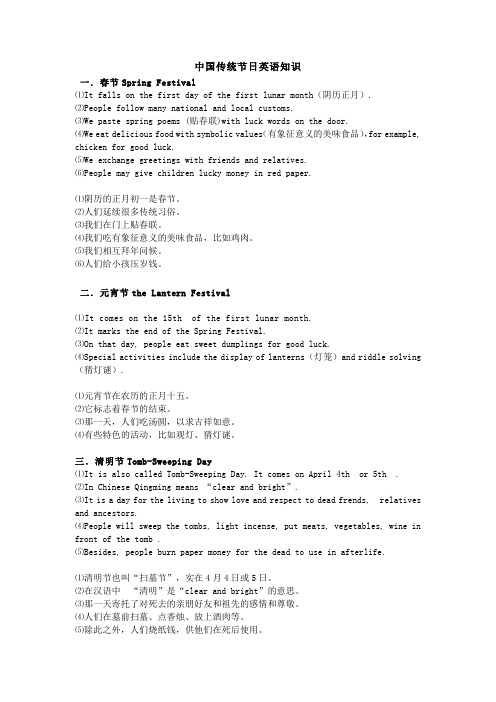
中国传统节日英语知识一.春节Spring Festival⑴It falls on the first day of the first lunar month(阴历正月).⑵People follow many national and local customs.⑶We paste spring poems (贴春联)with luck words on the door.⑷We eat delicious food with symbolic values(有象征意义的美味食品),for example, chicken for good luck.⑸We exchange greetings with friends and relatives.⑹People may give children lucky money in red paper.⑴阴历的正月初一是春节。
⑵人们延续很多传统习俗。
⑶我们在门上贴春联。
⑷我们吃有象征意义的美味食品,比如鸡肉。
⑸我们相互拜年问候。
⑹人们给小孩压岁钱。
二.元宵节the Lantern Festival⑴It comes on the 15th of the first lunar month.⑵It marks the end of the Spring Festival.⑶On that day, people eat sweet dumplings for good luck.⑷Special activities include the display of lanterns(灯笼)and riddle solving (猜灯谜).⑴元宵节在农历的正月十五。
⑵它标志着春节的结束。
⑶那一天,人们吃汤圆,以求吉祥如意。
⑷有些特色的活动,比如观灯、猜灯谜。
三.清明节Tomb-Sweeping Day⑴It is also called Tomb-Sweeping Day. It comes on April 4th or 5th .⑵In Chinese Qingming means “clear and bright”.⑶It is a day for the living to show love and respect to dead frends, relatives and ancestors.⑷People will sweep the tombs, light incense, put meats, vegetables, wine in front of the tomb .⑸Besides, people burn paper money for the dead to use in afterlife.⑴清明节也叫“扫墓节”,实在4月4日或5日。
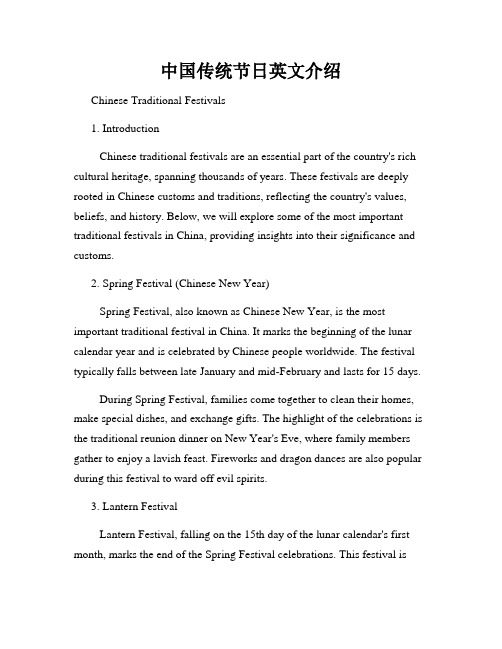
中国传统节日英文介绍Chinese Traditional Festivals1. IntroductionChinese traditional festivals are an essential part of the country's rich cultural heritage, spanning thousands of years. These festivals are deeply rooted in Chinese customs and traditions, reflecting the country's values, beliefs, and history. Below, we will explore some of the most important traditional festivals in China, providing insights into their significance and customs.2. Spring Festival (Chinese New Year)Spring Festival, also known as Chinese New Year, is the most important traditional festival in China. It marks the beginning of the lunar calendar year and is celebrated by Chinese people worldwide. The festival typically falls between late January and mid-February and lasts for 15 days.During Spring Festival, families come together to clean their homes, make special dishes, and exchange gifts. The highlight of the celebrations is the traditional reunion dinner on New Year's Eve, where family members gather to enjoy a lavish feast. Fireworks and dragon dances are also popular during this festival to ward off evil spirits.3. Lantern FestivalLantern Festival, falling on the 15th day of the lunar calendar's first month, marks the end of the Spring Festival celebrations. This festival ischaracterized by the display of colorful lanterns and various cultural activities.People often write riddles on their lanterns for others to solve, adding an element of fun and intellectual challenge to the festival. The iconic lanterns take many forms, including those shaped like animals, flowers, or famous landmarks. Watching the lanterns light up the night sky is a mesmerizing experience.4. Dragon Boat FestivalThe Dragon Boat Festival, also known as Duanwu Festival, is celebrated on the fifth day of the fifth lunar month. This festival commemorates the famous poet Qu Yuan and is characterized by the exciting racing of dragon boats.Dragon boat races involve teams of rowers paddling vigorously to the beat of a drum, competing to reach the finish line first. These races attract huge crowds of spectators who cheer and encourage the participants. Another significant tradition of this festival is the consumption of sticky rice dumplings called zongzi, which are wrapped in bamboo leaves.5. Mid-Autumn FestivalThe Mid-Autumn Festival, also known as the Moon Festival, is celebrated on the 15th day of the eighth lunar month. This festival is a time for family reunions and the appreciation of the full moon's beauty.The festival is closely associated with the legend of Chang'e, a celestial being who resides on the moon. During this festival, people gather to enjoy mooncakes, round pastries filled with various sweet or savory fillings.Lanterns in the shape of the moon are also prevalent during this festival, adding to the festive atmosphere.6. ConclusionChinese traditional festivals are not only grand celebrations but also an embodiment of the Chinese people's cultural identity and historical roots. Through these festivals, people reaffirm their bonds with family, pay respects to ancestors, and pass down customs and traditions to future generations.As China continues to modernize, it remains essential to preserve and cherish these traditional festivals as they play a vital role in maintaining cultural cohesion and fostering a sense of national unity. By understanding and appreciating these festivals, one can gain a deeper insight into the rich cultural tapestry of China.。

中国传统节日英语作文及翻译中国传统节日多种多样,是我中国悠久历史文化的一个重要组成部分。
下面是小编整理的中国传统节日英语作文,一起来看看吧!中国传统节日英语作文及翻译Chinese traditional festivals in various forms,rich in content,are our long history of the Chinese nation as an integral part of culture.Holiday of the origin and development is a gradual formation,exerts a subtle sound,and slowly infiltrated into the process of social life.It and social development,as are the development of human society to a certain stage of the product of our country these ancient holiday,most of them and astronomy,calendar,mathematics,and later carved out of the weather-related,at least on this from the literature can be traced back to "Summer is small" ,"Book of History" to the Warring States period,the year the division of 24 solar terms,has been basically in place,then the traditional holiday,all closely related to these Terms.Terms for the selection of holiday,subject to the conditions provided,the majority of holiday at the pre-Qin period,had been the horizon,but one of the custom content-rich and popular,but also has required a long process of development.Activity are the earliest and original customs of worship,superstition,taboo-related; myth legend to add a few holiday romantic; have on the religious holiday of the impact and effects; some historical figures have been given the timeless holiday Memory infiltration,all of which are integration of the content of cohesion holiday,the holiday so that the Chinese have a deep sense of history.To the Han Dynasty,China's major traditional festivals havebeen stereotyped,it is often said these holiday originated in the Han Dynasty,the Han are China's reunification after the first major period of development,political and economic stability,science and culture has developed greatly,and this holiday The final form provides a good social conditions.Holiday developed to the Tang Dynasty,from the original worship,taboos mysterious atmosphere of liberation,to entertainment etiquette type,become really good time of the festive season.Since then,the holiday has become a lively celebration,colorful,many sports,pleasure-seeking activities of the contents of the scene and quickly became a popular fashion,these customs has continued the development of enduring.It is worth mentioning that,in the long course of history,the ancient literati,poets of letters for a holiday to write a lot of famous through the ages,the poetry of well-known and was widely famous,so that our country's traditional holiday of deep infiltration culture,wonderful romance,big vulgar shows of Taiga,tastes.Chinese holiday there is a strong cohesion and a wide range of inclusive,one to the holidays,of national jubilation,which is a long history of our nation's long history of same,is a valuable spiritual heritage.The formation of traditional festivals,are a nation or country's history and culture of long-term accumulation of condensation process,the following list of those festivals,all are coming from the ancient development,so far from these popular holiday custom,but also can clearly see the the people of ancient social life and wonderful pictures.中国的传统节日形式多样,内容丰富,是我们中华民族悠久的历史文化的一个组成部分。
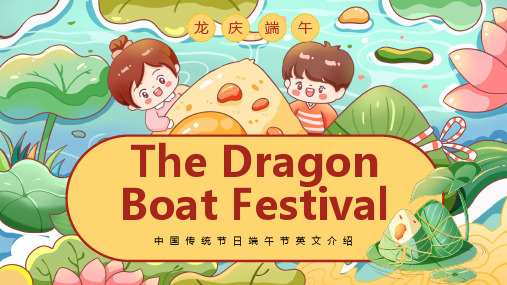
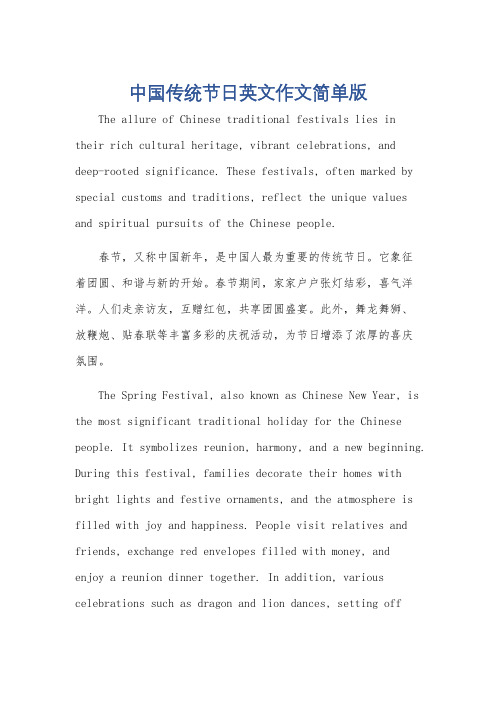
中国传统节日英文作文简单版The allure of Chinese traditional festivals lies intheir rich cultural heritage, vibrant celebrations, anddeep-rooted significance. These festivals, often marked by special customs and traditions, reflect the unique values and spiritual pursuits of the Chinese people.春节,又称中国新年,是中国人最为重要的传统节日。
它象征着团圆、和谐与新的开始。
春节期间,家家户户张灯结彩,喜气洋洋。
人们走亲访友,互赠红包,共享团圆盛宴。
此外,舞龙舞狮、放鞭炮、贴春联等丰富多彩的庆祝活动,为节日增添了浓厚的喜庆氛围。
The Spring Festival, also known as Chinese New Year, is the most significant traditional holiday for the Chinese people. It symbolizes reunion, harmony, and a new beginning. During this festival, families decorate their homes with bright lights and festive ornaments, and the atmosphere is filled with joy and happiness. People visit relatives and friends, exchange red envelopes filled with money, andenjoy a reunion dinner together. In addition, various celebrations such as dragon and lion dances, setting offfireworks, and posting couplets on doors add a festive and joyful atmosphere to the occasion.清明节,是祭祖和扫墓的日子。
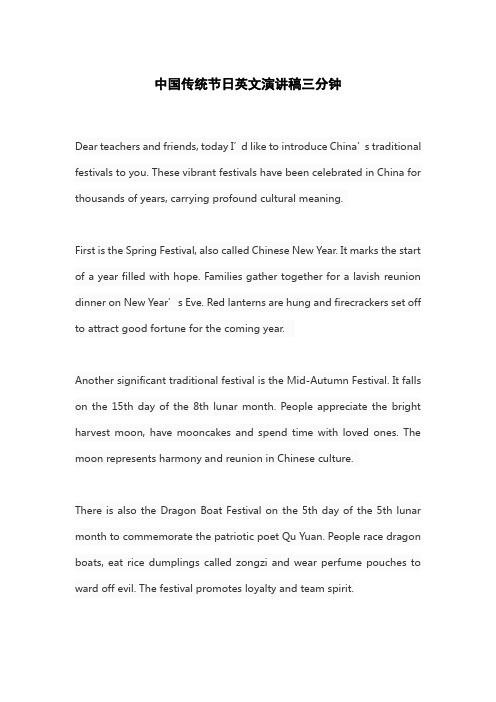
中国传统节日英文演讲稿三分钟Dear teachers and friends, today I’d like to introduce China’s traditional festivals to you. These vibrant festivals have been celebrated in China for thousands of years, carrying profound cultural meaning.First is the Spring Festival, also called Chinese New Year. It marks the start of a year filled with hope. Families gather together for a lavish reunion dinner on New Year’s Eve. Red lanterns are hung and firecrackers set off to attract good fortune for the coming year.Another significant traditional festival is the Mid-Autumn Festival. It falls on the 15th day of the 8th lunar month. People appreciate the bright harvest moon, have mooncakes and spend time with loved ones. The moon represents harmony and reunion in Chinese culture.There is also the Dragon Boat Festival on the 5th day of the 5th lunar month to commemorate the patriotic poet Qu Yuan. People race dragon boats, eat rice dumplings called zongzi and wear perfume pouches to ward off evil. The festival promotes loyalty and team spirit.Through colorful celebrations with family and friends, China’s traditional festivals foster cultural values like togetherness, gratitude and perseverance that remain relevant today. I hope you found this glimpse into Chinese festive customs insightful. Thank you for listening!尊敬的老师和朋友们,今天我想向大家介绍一下中国的传统节日。


中国传统节日和风俗英语Traditional Chinese Festivals and CustomsChina boasts a rich cultural heritage, and its traditional festivals and customs are an integral part of its vibrant tapestry. These festivals are deeply rooted in the country's long history and are celebrated with enthusiasm and reverence by the Chinese people. In this article, we will explore some of these traditional Chinese festivals and the customs associated with them.1. Chinese New Year (Spring Festival)Chinese New Year, also known as Spring Festival, is the most important traditional holiday in China. It falls on different dates each year, typically between late January and mid-February, depending on the lunar calendar. The festival is a time for family reunions, feasting, and honoring ancestors. Customary practices include hanging red lanterns and couplets, setting off fireworks, exchanging gifts (red envelopes with money), and participating in dragon and lion dances.2. Lantern FestivalThe Lantern Festival marks the end of the Chinese New Year celebrations and is held on the 15th day of the first lunar month. The festival is named after the thousands of beautiful lanterns that illuminate the streets and skies. People gather to solve riddles written on lanterns, watch lion dances, and eat sweet sticky rice balls, which symbolize family togetherness.3. Dragon Boat FestivalAlso known as Duanwu Festival, the Dragon Boat Festival is heldon the 5th day of the 5th lunar month, usually in June. The festival commemorates the death of the ancient poet Qu Yuan and involves dragon boat races, where teams of paddlers row to the beat of drums. People also eat zongzi, a type of sticky rice dumpling wrapped in bamboo leaves, and hang up pouches of herbs to ward off evil spirits.4. Mid-Autumn FestivalThe Mid-Autumn Festival is celebrated on the 15th day of the 8th lunar month, typically in September. This festival is dedicated to the moon goddess Chang'e and is a time for family gatherings. People enjoy mooncakes, which are round pastries filled with sweet or savory fillings, and admire the beauty of the full moon. Lanterns are also displayed, and children carry colorful lanterns while parading.5. Qingming Festival (Tomb-Sweeping Day)Qingming Festival usually falls on April 4th or 5th and is a time when Chinese people pay tribute to their ancestors. They visit ancestral graves to clean and maintain them, burn incense, and make offerings of food and paper money. This festival also marks the arrival of spring, and many people take the opportunity to enjoy nature and fly kites.6. Double Seventh Festival (Chinese Valentine's Day)The Double Seventh Festival, also known as Qixi Festival or Chinese Valentine's Day, falls on the 7th day of the 7th lunar month, usually in August. Legends tell of the forbidden love between a heavenly weaver maid and a mortal cowherd. On this day, couples exchange gifts, pray for love and happiness, andyoung single women make offerings to help find a good husband.In addition to these major traditional festivals, there are several other noteworthy celebrations, such as the National Day, the Lantern Festival, and the Ghost Festival. Each festival has its own unique customs and traditions, but all reflect the significance of family, unity, and cultural heritage in Chinese society.In conclusion, Chinese traditional festivals and customs provide glimpses into the rich tapestry of Chinese culture. These celebrations not only bring joy and happiness but also serve as a means to pass down traditions and honor the ancestors. The vibrant colors, delicious foods, and intricate rituals make Chinese festivals a truly enchanting experience.。
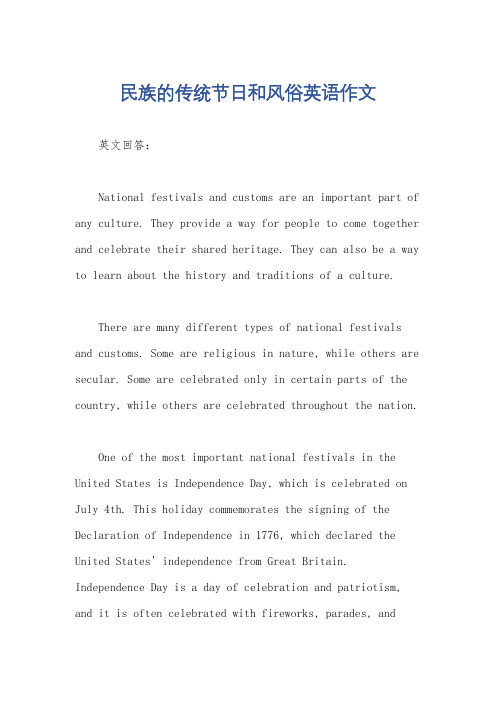
民族的传统节日和风俗英语作文英文回答:National festivals and customs are an important part of any culture. They provide a way for people to come together and celebrate their shared heritage. They can also be a way to learn about the history and traditions of a culture.There are many different types of national festivals and customs. Some are religious in nature, while others are secular. Some are celebrated only in certain parts of the country, while others are celebrated throughout the nation.One of the most important national festivals in the United States is Independence Day, which is celebrated on July 4th. This holiday commemorates the signing of the Declaration of Independence in 1776, which declared the United States' independence from Great Britain. Independence Day is a day of celebration and patriotism, and it is often celebrated with fireworks, parades, andpicnics.Another important national festival in the United States is Thanksgiving, which is celebrated on the fourth Thursday of November. This holiday commemorates the Pilgrims' harvest feast in 1621, which was shared with the Wampanoag Native Americans. Thanksgiving is a day of family and feasting, and it is often celebrated with a traditional meal of turkey, stuffing, and pumpkin pie.In China, one of the most important national festivals is the Spring Festival, also known as Chinese New Year. This holiday is celebrated on the first day of the first lunar month of the Chinese calendar, which usually falls in late January or early February. The Spring Festival is a time for families to come together and celebrate the coming of the new year. It is often celebrated with fireworks, dragon dances, and lion dances.In India, one of the most important national festivals is Diwali, also known as the Festival of Lights. This holiday is celebrated on the last day of the Hindu month ofKartik, which usually falls in late October or early November. Diwali is a time for Hindus to celebrate the victory of good over evil. It is often celebrated with fireworks, lights, and sweets.National festivals and customs are an important part of any culture. They provide a way for people to come together and celebrate their shared heritage. They can also be a way to learn about the history and traditions of a culture.中文回答:民族的传统节日和风俗是任何文化中不可或缺的一部分。
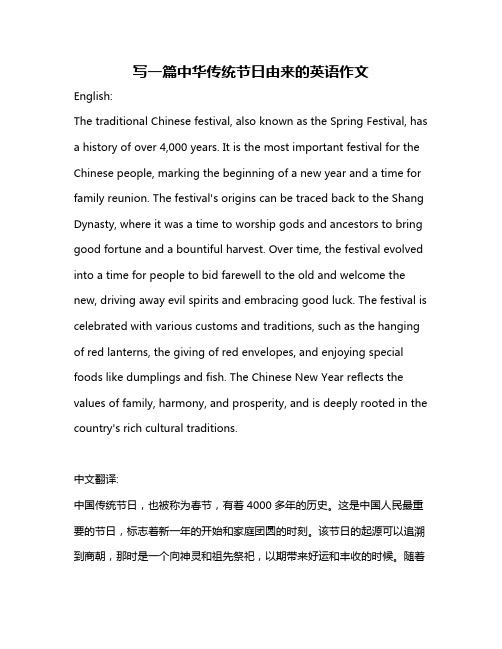
写一篇中华传统节日由来的英语作文English:The traditional Chinese festival, also known as the Spring Festival, has a history of over 4,000 years. It is the most important festival for the Chinese people, marking the beginning of a new year and a time for family reunion. The festival's origins can be traced back to the Shang Dynasty, where it was a time to worship gods and ancestors to bring good fortune and a bountiful harvest. Over time, the festival evolved into a time for people to bid farewell to the old and welcome the new, driving away evil spirits and embracing good luck. The festival is celebrated with various customs and traditions, such as the hanging of red lanterns, the giving of red envelopes, and enjoying special foods like dumplings and fish. The Chinese New Year reflects the values of family, harmony, and prosperity, and is deeply rooted in the country's rich cultural traditions.中文翻译:中国传统节日,也被称为春节,有着4000多年的历史。
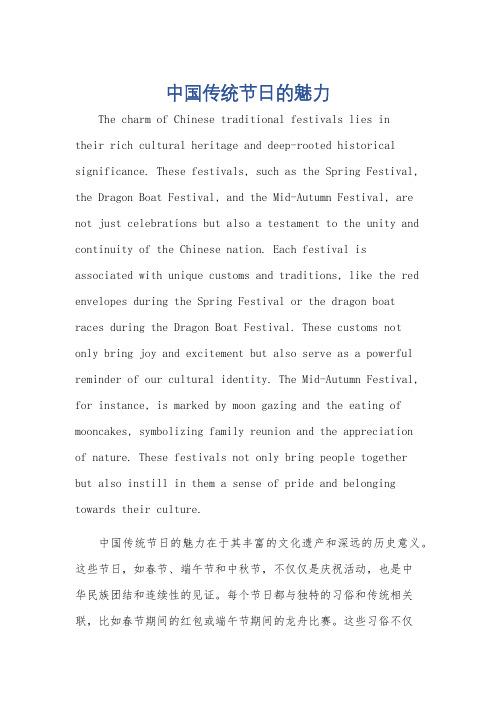
中国传统节日的魅力The charm of Chinese traditional festivals lies intheir rich cultural heritage and deep-rooted historical significance. These festivals, such as the Spring Festival, the Dragon Boat Festival, and the Mid-Autumn Festival, are not just celebrations but also a testament to the unity and continuity of the Chinese nation. Each festival is associated with unique customs and traditions, like the red envelopes during the Spring Festival or the dragon boat races during the Dragon Boat Festival. These customs not only bring joy and excitement but also serve as a powerful reminder of our cultural identity. The Mid-Autumn Festival, for instance, is marked by moon gazing and the eating of mooncakes, symbolizing family reunion and the appreciationof nature. These festivals not only bring people together but also instill in them a sense of pride and belonging towards their culture.中国传统节日的魅力在于其丰富的文化遗产和深远的历史意义。

介绍中国传统节日的英语作文的一封信(中英文版)Dear friend,I hope this letter finds you well.Today, I want to share with you the fascinating world of traditional Chinese festivals.China has a rich and diverse cultural heritage, and its festivals are a reflection of this.Each festival has its unique customs, rituals, and significance, making them an integral part of our national identity.亲爱的朋友,希望你一切都好。
今天,我想跟你分享中国传统节日的迷人世界。
中国拥有丰富多样的文化遗产,而其节日正是这一点的体现。
每一个节日都有其独特的习俗、仪式和意义,成为我们民族认同感的重要组成部分。
As the Chinese New Year, also known as Spring Festival, approaches, families gather to celebrate the beginning of a new lunar year.It"s a time filled with joy, laughter, and vibrant colors.Red lanterns, fireworks, and couplets adorned with lucky phrases create an atmosphere of excitement and hope.随着春节,即农历新年的临近,家家户户都会聚在一起庆祝新的一年的到来。
这是一个充满欢乐、笑声和鲜艳色彩的时刻。
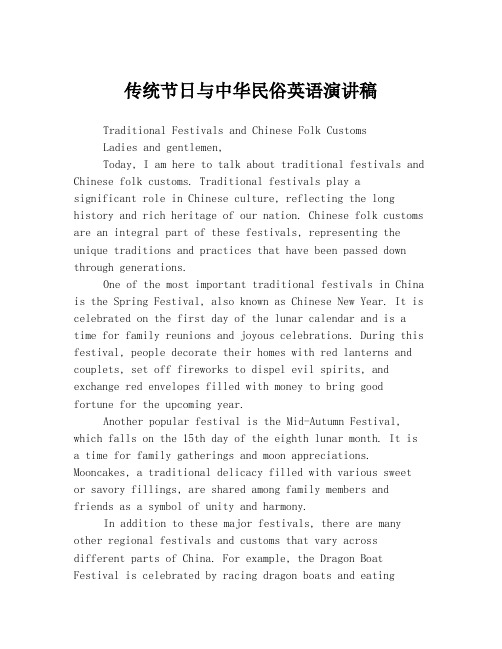
传统节日与中华民俗英语演讲稿Traditional Festivals and Chinese Folk CustomsLadies and gentlemen,Today, I am here to talk about traditional festivals and Chinese folk customs. Traditional festivals play asignificant role in Chinese culture, reflecting the long history and rich heritage of our nation. Chinese folk customs are an integral part of these festivals, representing the unique traditions and practices that have been passed down through generations.One of the most important traditional festivals in China is the Spring Festival, also known as Chinese New Year. It is celebrated on the first day of the lunar calendar and is a time for family reunions and joyous celebrations. During this festival, people decorate their homes with red lanterns and couplets, set off fireworks to dispel evil spirits, and exchange red envelopes filled with money to bring goodfortune for the upcoming year.Another popular festival is the Mid-Autumn Festival, which falls on the 15th day of the eighth lunar month. It is a time for family gatherings and moon appreciations. Mooncakes, a traditional delicacy filled with various sweet or savory fillings, are shared among family members and friends as a symbol of unity and harmony.In addition to these major festivals, there are many other regional festivals and customs that vary across different parts of China. For example, the Dragon Boat Festival is celebrated by racing dragon boats and eatingsticky rice dumplings to commemorate the ancient poet Qu Yuan. The Lantern Festival is marked by the lighting of colorful lanterns and solving riddles written on them.Chinese folk customs are deeply rooted in our dailylives and are evident in various aspects such as weddings, funerals, and traditional rituals. For instance, in a traditional Chinese wedding, there are customs such as the bride wearing a red wedding dress, serving tea to the parents, and receiving red packets from relatives and friends.In conclusion, traditional festivals and Chinese folk customs are vital elements of our cultural heritage. They not only bring joy and happiness to our lives but also serve as a way to connect with our ancestors and preserve our traditions. Let us cherish and continue to pass on these precious customs to future generations.Thank you.。

介绍中国传统节日的英语作文英文回答:Chinese traditional festivals are a vibrant andintegral part of our culture, each carrying a unique significance and steeped in centuries of history. These festivals serve as opportunities to gather with loved ones, celebrate our heritage, and pay homage to our ancestors.Among the most important festivals is the春节(ChūnJié), or Spring Festival, also known as Chinese New Year. It marks the end of winter and the beginning of a new lunar year. Festivities include family reunions, lavish feasts, and the setting off of firecrackers to ward off evil spirits.Another significant festival is the端午节(Duān WǔJié), or Dragon Boat Festival, which commemorates the life and death of the renowned poet Qu Yuan. During this festival, people race dragon boats, eat zongzi (glutinousrice dumplings), and ward off disease by drinking realgar wine.The中秋节(Zhōng Qiū Jié), or Mid-Autumn Festival,is a time for family reunions and moon gazing. People gather to enjoy mooncakes, lanterns, and the beauty of the full moon.The清明节(Qīng Míng Jié), or Tomb-Sweeping Day, is a day to honour and remember our ancestors. People visit the graves of their loved ones, clean them, and offer food and prayers.The七夕节(Qī Xī Jié), or Double Seventh Festival,is a romantic festival that celebrates the love between the cowherd and weaver girl in Chinese folklore. People make wishes on this day, write love letters, and exchange gifts.These are just a few examples of the many traditional festivals celebrated in China. Each festival has its own unique traditions, customs, and symbolism, adding to the richness and diversity of our cultural heritage.中文回答:中国传统节日是中华文化中不可或缺的一部分,每一个节日都承载着独特的意义,有着悠久的历史。
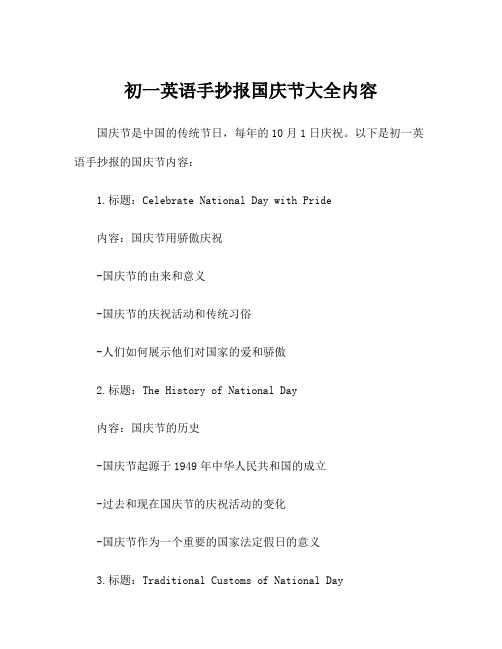
初一英语手抄报国庆节大全内容国庆节是中国的传统节日,每年的10月1日庆祝。
以下是初一英语手抄报的国庆节内容:
1.标题:Celebrate National Day with Pride
内容:国庆节用骄傲庆祝
-国庆节的由来和意义
-国庆节的庆祝活动和传统习俗
-人们如何展示他们对国家的爱和骄傲
2.标题:The History of National Day
内容:国庆节的历史
-国庆节起源于1949年中华人民共和国的成立
-过去和现在国庆节的庆祝活动的变化
-国庆节作为一个重要的国家法定假日的意义
3.标题:Traditional Customs of National Day
内容:国庆节的传统习俗
-举国同庆的盛大阅兵仪式
-重要领导人的讲话和慰问
-民众参加游行、升国旗和放烟花等活动
4.标题:Celebrating National Day Safely
内容:安全庆祝国庆节
-安全使用烟花和爆竹的提示
-防止火灾和其他意外的安全措施
-呼吁人们尊重环境,保护国家资源
5.标题:We Love Our Country
内容:我们热爱我们的国家
-表达对国家的爱和骄傲的手工艺品展示
-学生写下他们对祖国的祝福和感激之情
-鼓励学生们参与社区的公益活动,为国家做贡献
手抄报中可以配上相应的图片、图表和插图,以更加生动形象的展现国庆节的内容和意义。

The Splendor of Chinese Traditional Festivalsand CustomsChina, a vast and ancient land, is renowned for itsrich cultural heritage. Among this heritage, thetraditional festivals and customs stand out as a vibrant display of the nation's historical and cultural essence. These festivals, often interwoven with legends and folklore, reflect the deep-seated values, beliefs, and aspirations of the Chinese people.The Spring Festival, also known as the Chinese New Year, is the most significant and auspicious festival in China.It is a time for family reunions, with people travelingfrom far-flung corners of the country to be with theirloved ones. The air is filled with the aroma of incense and fireworks, and the streets are adorned with red lanternsand couplets. The custom of giving red envelopes, known as "hongbao," adds a festive touch, symbolizing good luck and prosperity.The Dragon Boat Festival, falling on the fifth day ofthe fifth month of the lunar calendar, commemorates the ancient tradition of racing dragon boats to save the lifeof the patriotic poet Qu Yuan. This festival is marked by dragon boat races, where teams row vigorously in decorated boats, and the eating of zongzi, sticky rice wrapped in bamboo leaves.The Mid-Autumn Festival, which falls on the 15th day of the 8th month of the lunar calendar, is a time for moon gazing and family reunions. The round moon is a symbol of completeness and harmony, and people gather to enjoy the moonlit night, sharing stories and eating mooncakes. Mooncakes, with their round shape, symbolize unity and completeness.The Double Ninth Festival, also known as the Chongyang Festival, falls on the ninth day of the ninth month of the lunar calendar. This festival is associated with climbing mountains, wearing dogwood, and drinking chrysanthemum wine. It is also a time to honor the elderly, reflecting the Chinese virtue of respecting the old.These festivals and customs are not just occasions for celebration; they are also repositories of traditional knowledge and cultural practices. They provide a windowinto the rich tapestry of Chinese culture, reflecting itsdeep-seated values and the spirit of its people. As China continues to embrace modernization, these traditional festivals and customs remain as vibrant and relevant as ever, serving as a bridge between the past and the future. **中国传统节日与中华民俗的绚烂**中国,这片辽阔而古老的土地,因其丰富的文化遗产而闻名于世。

中国传统节日的魅力The charm of Chinese traditional festivals lies intheir rich cultural heritage and deep historical significance. These festivals, such as the Spring Festival, the Dragon Boat Festival, and the Mid-Autumn Festival, are not just occasions for celebration, but also a way of life that reflects the values and traditions of the Chinese people.The Spring Festival, known as the Chinese New Year, is the most important festival in China. It symbolizes reunion and new beginnings, with families gathering together to feast, give red envelopes, and set off fireworks. The Dragon Boat Festival, which falls on the fifth day of the fifth lunar month, is marked by dragon boat races and the eating of zongzi, a traditional rice dish wrapped in bamboo leaves. This festival commemorates the ancient Chinese poet Qu Yuan. The Mid-Autumn Festival, on the 15th day of the8th lunar month, is a time for family gatherings and moon gazing, with the eating of mooncakes being a central custom. These festivals are not just about celebration; theyare also a way for the Chinese people to preserve and传承their rich cultural heritage. Each festival has its unique traditions and customs, reflecting the values and beliefsof the Chinese nation. Through these festivals, we can gain a deeper understanding of Chinese culture and the spirit of the Chinese people.**中国传统节日的魅力**中国传统节日的魅力在于其丰富的文化内涵和深远的历史意义。
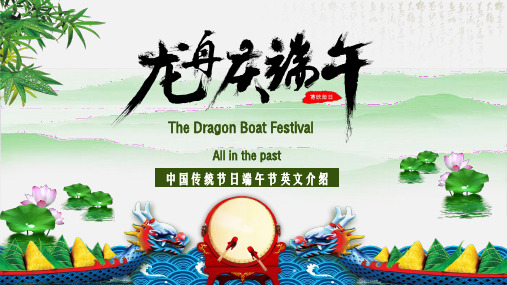

中国国庆节的节日风俗英语国庆节的习俗英文:national day customs例句:chinas national day, people like to watch the performances, like to watch the beautiful fireworks fly. the state council held a grand military parade procession.中国的国庆节,人们喜欢去看热闹的`演出,喜欢看美丽的焰火腾空。
国家会举行盛大的阅兵游行。
例段:all countries in the world have their own national day, national day in different countries of the festive way, as the traditional and customs of the differences, and different.the national day is an important feast for every country, but the various countries national day nameis different. many countries in the world is called "national day" or "national day", and some countries called "independence day" or "independence day", also some call "republican", "republic day day", "revolution day", "liberation", "national rejuvenation day" and "constitution day", still have to add the name directly "day", such as "australia day", "pakistan day", others in the kings birthday or coronation day as the national day, such as the case of the king, the date of the national day changes will be replaced.national day each year, countries have a different forms of celebration activities to strengthen its peoples patriotic consciousness, strengthen the countrys cohesive force. between the various countries to also congratulate each other. the national day every ten every five, some will expand to celebrate. to celebrate the national day, governments usually we will hold a national day conference, by national heads of state or government or foreign minister, invited presiding in all countries in the local ambassadors and other important foreign guests to attend. but some countries do not held a reception, such as the united states, britain are not held a reception.世界上每个国家都有自己的国庆节,由于传统和习俗的差异,各国庆祝国庆节的方式也各不相同。
National CustomsGift Giving Etiquette in China中国送礼礼仪. In general, gifts are given at Chinese New Year, weddings, births and birthdays.. Do not give scissors, knives as they indicate暗示the severing of the relationship. 切断关系. Do not give clocks, handkerchiefs as they are associated with funerals and death.与葬礼与死亡有联系. Do not wrap gifts in white or black paper.. Four is an unlucky number so do not give four of anything. Eight is the luckiest number, so giving eight of something brings people luck. . Always present gifts with two hands.. Gifts are not opened when received.. Gifts may be refused three times before they are accepted. British Social Customs英国社交礼仪TimeBritish people place considerable value on punctuality.非常注重准时In Britain, people make great effort 努力to arrive on time. It is often considered impolite不礼貌的to arrive even a few minutes late. If you are unable to keep an appointment, 守约it is expected that you call the person you are meeting.Invitations“ Drop in anytime” and “come see me soon” are idioms often used in social settings but seldom meant to be taken literally. It is wise to telephone before visiting someone at home.Never accept an invitation unless you really plan to go. You may refuse by saying, “Thank you for invitin g me, but I will not be able to come.”It is considered polite to give a gift to your host, especially if you have been invited for a meal. Flowers, chocolate, or a small gift are all appropriate.合适的A thank-you note or telephone call after the visit is also considered polite to express your appreciation感谢for the invitation.Introduction and GreetingIt is proper to shake hands with everyone to whom you are introduced, both men and women. An appropriate response to an introduction is "Pleased to meet you". If you want to introduce yourself to someone, extend your hand伸出for a handshake and say "Hello, I am....". Hugging is only for friends.Chinese and western table mannersManners in every country are different. What is polite in China may not be polite in western countries. There are some basic rules. The best way to learn good manners is to watch others. This is the best way to avoid making mistakes when you are unsure of 不确定what to do.In western countries-Soup, as well as all American food is eaten quietly. Do not slurp 发出声音the soup. While eating, remember not to talk with your mouth full of food.-In America, people do not use toothpicks 牙签at the table.-With the American style, you hold the fork in your left hand and the knife in your right hand to cut your meat or vegetables.-The real difference is that in the West, you have your own plate of food, while in China the dishes are placed on the table and everyone shares.In China-On a typical Chinese dining table, dishes are always presented in被放在the center of the table.-Apart from除了soup, all dishes should be eaten with chopsticks. Never stick chopsticks in the center of rice, as this is the way to sacrifice. 祭祀- Chinese hosts like to put food into the plates of their guests.给客人夹菜This is a sign标志of politeness.礼貌In formal dinners, there are always "public" chopsticks and spoons. It is always polite to eat the food. If you do not eat it, just leave the food in the plate.Should burning firecrackers and fireworks be banned?No, I don’t think it should be banned during the Spring Festival. Actually the custom of burning firecrackers and fireworks is related to 与…相关the story of Nian. Besides, burning firecrackers and fireworks during the Spring Festival can bring people happy festive atmosphere 节日气氛and children could get a lot of fun from it. If it were banned, Nian and the bad luck wouldn’t be scared away; there wouldn’t be festive atmosphere on the New Year’s Eve, and children might have less fun since it would become quiet.There is also some downside缺点of burning firecrackers and fireworks. It’s noisy and dangerous. So if I were a policy maker, I would restrict限制the time and place of burning firecrackers and fireworks. And if I had children, I would watch my kids carefully to prevent them from being hurt by burning firecrackers and fireworks.Lantern FestivalLantern Festival falls on 在…the 15th day of the 1st lunar month,正月十五which marks the end of the Spring Festival. This day's important activity is watching lanterns. Actually what makes the festival special is not the day but the night. Lanterns of various shapes and sizes 各种形状和大小的are hung 被挂在in the streets. Guessing lantern riddles is a part of the festival, which is interesting and full of wisdom .充满智慧If visitors have the right answers to the riddles, they will get gifts. People eat Yuan Xiao on this day, so it is also called Yuan Xiao Festival and Yuan Xiao is small ball made of glutinous rice flour 糯米粉and tastes sweet.Qing Ming Festival/ Tomb-sweeping DayTomb-Sweeping Day usually falls on April 4, 5 or 6 each year which means clear and bright 清新明亮in Chinese. Because the Chinese believe that the spirits of deceased ancestors逝去的祖先would look after the family, it is also a day to visit ancesto r’s graves , sweep away the dirt and leave offerings 祭品.Since it has become a public holiday, people should take the opportunity to explore the traditional holiday from cultural and historical aspects.从文化和历史的角度Tomb-Sweeping Day should not become a day just for visiting ancestor's graves 祖先的坟墓and burning paper money. Instead, according to tradition, theTomb-Sweeping Day should be a festival for returning to nature , not just to cry over the deceased.逝者Dragon Boat FestivalIt is celebrated on the 5 day of the 5th lunar month. In China, legend says 传说说道that the festival commemorates纪念China’s patriotic poet, 爱国诗人Qu Yuan, who was Chu people in Warring States period 战国时期and drowned himself in 投河自尽the Miluo River. Because of people’s love for him, they tr ied to save him and jumped into their boats and searched 寻找the river for him. They also threw zongzi to the fish, hoping to keep them from eating 不让它们吃Qu Yuan’s body. The poet was never found, but is still remembered each Dragon Boat Festival. Today, People honor 纪念the festival by eating zongzi and watching or competing in 参加竞赛dragon boat races. Zongzi is glutinous rice wrapped in 被包在the bamboo leaves.粽叶Mid-Autumn FestivalThe Mid-autumn Festival falls on the 15th day of the 8th lunar month,which is a season when crops 庄稼and fruits are all ripe 成熟and weather is pleasant.宜人的In the Ming and Qing dynasties,朝代it grew to be 成为a major 重大的festival of China. It’s a time for the whole family to get together. Today people will enjoy the full moon 赏满月and eat moon cakes on that day. The cakes are stuffed with 充满了meat, eggs, melon seeds 果仁and so on. On that day, the moon looks extremely 极其的round, big and bright. In China, a full moon symbolizes reunion.标志着团圆On the Mid-autumn Festival, all family members or friends get together to eat moon cakes, thinking of 思念their relatives and friends, as the Chinese saying goes: on festive occasions more than ever we think of our dear ones far away. 每逢佳节倍思亲Double Ninth Day重阳节The Double Ninth Day falls on the 9th day of the 9th lunar month. According to traditional Chinese yin and yang theory, nine is a yang number; therefore it is also called Double Yang Festival. For some time in history, it was called Mountain-climbing Festival, or Zhuyu Festival, as there was a custom of climbing mountains and hanging on a herb草本植物called zhuyu on the door. In the old days, people believed that Zhuyu could avoid bad luck, and protect people from getting disease.辟邪祛病As early as in the West Han Dynasty, the practice of hanging zhuyu on the Double Ninth Day was popular, and it was considered good to people’s health and lead to longevity.长寿Nowadays, the Double Ninth Festival is fixed as the Elderly Day, on which activities are held to show respect and love to the elderly people. On last Double Ninth Day, my parents and I took my grandparents to the Yangtai Mountain and enjoyed the tea in Dajue Temple.Which traditional custom has been forgotten by people? Well, Kowtow is one of them. It is an old Chinese custom of touching the ground with one’s forehead额头as a sign of respect or submission服从/屈服. My grandparents told me that they used to Kowtow to their senior relatives during New Year’s Visit in order to get the Red-Envelope Money, but now we don’t need to do that anymore.Some customs on Chinese traditional wedding ceremony have been forgotten too. Because of western culture’s influence, gone forever are those days when we Chinese were obeying all the traditional customs, such as using sedan chair轿子to pick up the bride, havingarm-crossed drink,喝交杯酒groom wearing gown,长袍bride wearing red veiling.红盖头Bride and groom first bow to Heaven and Earth. 拜天地Then, they bow to their parents to show respect to their parents and ancestors.祖先At last they bow to each other to make sure they will love each other for ever. Here comes the time when Chinese wedding has been westernized被西化a lot: the bride wearing white bridal gown,白色婚纱exchanging rings, recording video and so on. Red Color in ChinaRed is the traditional Chinese symbol of happiness, success, and prosperity. 兴旺,繁荣And red is the dominant color显著的颜色at a traditional Chinese wedding. The whole family is covered with red paper-cuts of the Chinese character “double happiness”. The bride wears red flowers on head, red clothes, and red shoes.Western wedding ceremonyThe western wedding ceremony is usually held in the church. The priest牧师asks the bride and bridegroom in turn:轮流“Will you take this man/woman to be your lawfully wedded husband/wife?“合法丈夫/妻子The bride and bridegroom say “I will! ”. At t he end of the ceremony, the priest says:” I now pronounce宣布you husband and wife”, which means they are officially married. 正式结婚The wedding ceremony usually is followed by a wedding reception where a meal and wedding cake are served. |Tibetans’ outfit藏族人的服装Tibetans like to wear leather clothes and the clothes made of wool. Usually, these clothes are big and loose. They can be used as clothes during the day, and can also be used as quilts被子during the night. The sleeves are, normally, long and wide in order to make their arms move freely. Another reason is the weather conditions. In Tibet, the temperature goes up and down quickly during the day and the night. The Tibetans will take off one sleeve 袖子and tie it up at the waist 腰when it gets hot. When it gets cold, they will put on the sleeve again. So it is rather convenient.Customs of ethnic minorities少数民族China is a country with 56 nationalities, 民族among which Han nationality takes more than 90%, and the rest are the minority nationalities. 少数民族Different minority nationalities have different cultures and different customs.Water-Splashing Festival泼水节It is the New Year, as well as the most important traditional festival celebrated by the Dai nationality in Yunnan Province of China . It is usually between 13th and 15th April in solar calendar.阳历Upon that day, people splash water to each other, showing their sincere blessing真挚的祝福with splashing spray, wishing that they would be lucky and free from diseases.Torch Festival火把节It falls on the 24th day of the sixth lunar month, which is a traditional festival of the Yi, Bai, Na xi and some other minority nationalities. People gather together and participate in various activities, such as dancing and fireworks displaying. And it’s a good chance for young men and women to meet their prospective spouses. 未来的配偶They will gather around a big torch, singing and dancing through the night in the hope of prosperities繁荣in the coming year.The Mongolian people蒙古族人They are famous for horse-riding, wrestling, 摔跤singing and dancing.I have been to the Mongolian Aubao for dinner. The Mongolians showed their hospitality好客by singing beautiful songs to the guests during the meal.。